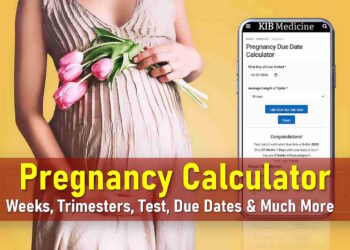Conception Date Calculator: Estimating the Start of Your Pregnancy
One of the most common questions for expectant mothers is, “When did I conceive?” Determining the exact date of conception can be tricky, especially since not all women experience noticeable signs of early pregnancy or implantation. If there were multiple instances of sexual intercourse during the fertile window, it can add to the complexity. Our conception calculator is a helpful tool designed to estimate your conception date and provide a better understanding of your pregnancy timeline.
Related Calculators
What Is a Conception Date Calculator?
A conception calculator is an easy-to-use tool that helps estimate the likely date of fertilization. It typically relies on key details such as the first day of your last menstrual period (LMP) or your expected due date. While these calculators are highly informative, it’s important to remember that they offer an estimate rather than absolute certainty, as menstrual cycles and conception can vary significantly from one person to another.
How Does Our Conception Calculator Work?
Our pregnancy conception calculator estimates the likely date of conception by analyzing your pregnancy’s due date. It also provides a broader range of dates to account for natural variations in cycle length and other factors. Here’s what our calculator can determine for you:
- Your most likely conception date
- A probable range of conception dates
- The most likely dates of sexual intercourse that led to pregnancy
- A broader range of possible conception dates
- An extended range of potential dates for sexual intercourse that could have resulted in pregnancy
Using a Conception Calculator Based on LMP
If you remember the first day of your last menstrual period (LMP), you can use our Ovulation Calculator to determine your conception date or estimate your pregnancy timeline.
How to Interpret Your Results
The results from a conception calculator provide an estimate of the most likely timeframe for conception. Here’s how to understand them:
- Most likely conception date: This is the estimated date when fertilization likely occurred, based on average ovulation patterns.
- Most probable conception date range: This range accounts for slight variations in ovulation timing.
- Most likely dates of sexual intercourse: This includes dates when intercourse could have resulted in pregnancy, considering that sperm can live in the female reproductive system for several days.
- Possible conception dates: A broader range of dates that accounts for variations in menstrual cycles and sperm survival.
Understanding Fertilization, Conception, and Pregnancy
To use a conception calculator based on due date, it’s helpful to understand the differences between ovulation, fertilization, and conception:
- Ovulation: The release of a mature egg from the ovary, which typically occurs about 14 days before the start of the next menstrual period.
- Fertilization: When a sperm successfully merges with an egg in the fallopian tube, usually within 24 hours of ovulation.
- Conception: In medical terms, conception includes both fertilization and the subsequent implantation of the fertilized egg into the uterus, which typically occurs 6-12 days after fertilization.
In summary, ovulation releases the egg, fertilization combines the egg and sperm, and conception completes the process with implantation, marking the beginning of pregnancy.
Why Use a Conception Calculator?
There are several reasons why a baby conception calculator can be an invaluable tool for expectant parents. Here are some of the key benefits:
- Determining paternity: If there is uncertainty about the biological father, a conception calculator can help narrow down the timeframe when conception likely occurred, offering valuable insights.
- Planning prenatal care: Knowing the approximate date of conception allows you and your healthcare provider to plan essential prenatal checkups and monitor your baby’s development more effectively.
- Gaining insight into your body: Learning about your conception date can improve your understanding of your menstrual cycle and fertile window, which may be helpful for future family planning.
- Building emotional connections: For many parents, knowing the likely date of conception adds sentimental value, fostering a deeper connection to their pregnancy journey.
How Accurate Is a Conception Calculator?
While we strive to make our accurate conception calculator as reliable as possible, several factors can influence the precision of the results:
- Irregular menstrual cycles: Women with irregular cycles may find it harder to predict ovulation, making conception dates less exact.
- Variation in implantation timing: The time it takes for a fertilized egg to implant in the uterus can differ among women, which impacts the estimated conception date.
- Sperm viability: Since sperm can survive in the female reproductive system for up to five days, conception could occur several days after intercourse.
- Late ovulation: Ovulating later than expected can affect calculations based on average cycle lengths, leading to less accurate results.
For these reasons, our calculator provides a range of possible dates to account for these natural variations, ensuring you receive the most reliable estimate possible.
Reverse Conception Calculator
A reverse conception calculator works by estimating your conception date based on your due date. This method is especially helpful if you’re unsure of your last menstrual period but have been given a due date by your healthcare provider.
To use our tool as a reverse conception calculator, simply input your due date. It will calculate your likely conception date and possible dates of sexual intercourse that may have resulted in pregnancy.
When to Consult a Healthcare Provider
Although a conception calculator can be a useful guide, it’s essential to rely on a healthcare provider for comprehensive care. You should consult with your doctor for:
- Confirmation of your pregnancy
- Precise dating of your pregnancy through ultrasound or other medical methods
- Ongoing prenatal care and monitoring
- Addressing any concerns about your health or pregnancy
Conclusion
Our conception calculator offers an insightful way to estimate when you likely conceived, providing a helpful perspective on your pregnancy timeline. By delivering a range of possible dates, it accommodates the natural variability in conception and helps you better understand your journey to parenthood.
While this tool can be valuable for planning, resolving questions of paternity, or simply satisfying curiosity, it is not a replacement for professional medical advice. Always consult your healthcare provider for the most accurate information and guidance.
Whether you’re using the calculator to plan ahead or deepen your connection to your pregnancy, we hope it supports you in this beautiful and transformative journey. Remember, every pregnancy is unique, and the joy of parenthood is far more significant than pinpointing the exact moment of conception.

































